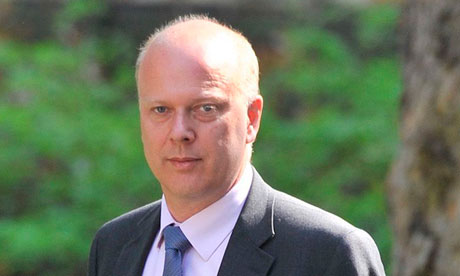Letter sent to justice secretary by senior Catholic officials warns that residency test for legal aid will harm vulnerable people

The justice secretary, Chris Grayling, who has said people who have arrived recently in the UK can 'end up in our courts at our expense'. Photograph: Rex Features
Victims of human trafficking and domestic abuse will be deprived of courtroom support under government proposals to make further cuts in legal aid, the Catholic church has warned the justice secretary.
Chris Grayling has been sent a letter signed by senior Catholic officials and charities condemning his proposals for introducing a dual residency test on the grounds that it will harm the most vulnerable who have recently arrived in the United Kingdom.
The letter, seen by the Guardian, has been released on the day that lawyers in London stage protests against the Ministry of Justice's consultation, Transforming Legal Aid, which is aimed at slicing at least £220m out of the annual legal aid budget.
The MoJ consultation, reflecting political concerns about immigration, declares that "individuals with little or no connection to this country are currently able to claim legal aid to bring civil legal actions at UK taxpayers' expense".
It proposes that legal aid should be available only for people lawfully resident in the UK who have lived in the country for at least 12 months. Members of the armed forces and asylum seekers, however, would be exempt from this two-stage residence test.
The letter from representatives of the Catholic church calls for similar exemptions to be given to victims of human trafficking and domestic violence.
It is signed by Bishop Patrick Lynch, chair of the Catholic Bishops' Conference for Migration Policy, Helen O'Brien, chief executive of Caritas Social Action Network, Sister Lynda Dearlove, founder of Women@theWell, which supports street-based prostitutes and rough sleepers, Cathy Corcoran, chief executive of the Cardinal Hume Centre, and Louise Zanre, director of the Jesuit Refugee Service.
"We are extremely concerned that no equivalent exemptions are planned for cases involving victims of human trafficking or domestic violence," they warn, "undermining protections in the Legal Aid, Sentencing and Punishment of Offenders Act.
"During [that] act's passage through parliament last year, the government acknowledged that 'trafficking is a heinous, cynical crime' and made specific amendments to maintain legal aid for compensation and immigration matters regarding trafficking victims, given their 'particular vulnerabilities'.
"Failing to replicate [these protections] under the new system will mean that victims of these appalling crimes, who are already reticent about speaking out, will either be deprived of the legal support they need or forced to wait up to 12 months with significant consequences for their safety and wellbeing.
"We sincerely hope that current proposals may be amended to ensure that these most vulnerable people are protected."
O'Brien added: "These proposals are deeply concerning and if they go ahead in their current form we have real concerns that vulnerable individuals, including overseas residents trapped in relationships with violent partners and victims of human trafficking, could be left unable to access any legal representation.
"Human trafficking and domestic abuse are truly horrific crimes. We have genuine concerns that any restriction of legal aid in such cases may mean that these abuses will go unreported and that perpetrators of these crimes will not be brought to justice."
Last month the justice secretary told the Telegraph: "There have been examples of people who have come to the country for extraordinarily short periods of time who have had a relationship breakdown and then they end up in our courts at our expense to determine custody of the children.
"This will exclude people who enter the country illegally, who up to now have been able to access our legal aid system in a way I don't think should ever have happened."